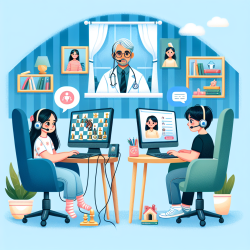Introduction
Obsessive-compulsive disorder (OCD) in children is a significant mental health concern that can heavily impact both the affected individuals and their families. Traditional cognitive behavioral therapy (CBT) has been effective in treating OCD, but access to such treatment is often limited, especially in rural areas. The study "Internet-based psychotherapy in children with obsessive-compulsive disorder (OCD): protocol of a randomized controlled trial" explores the potential of internet-based cognitive behavioral therapy (iCBT) to bridge this gap.
The Research Study
The study aims to evaluate the effectiveness of iCBT for children with OCD by replacing traditional face-to-face CBT elements with teleconferences, online materials, and apps. This approach includes 14 teleconference sessions involving both the child and their parents, supported by an app that tracks daily and weekly symptoms. The study employs a randomized controlled trial design with a waiting list control group to ensure robust data collection and analysis.
Key Findings and Implications
Initial findings from the pilot study indicate that iCBT is feasible and well-received by both patients and clinicians. The integration of technology not only makes therapy more accessible but also allows treatment to occur in the child's natural environment, where symptoms are most prevalent. This approach is particularly beneficial in rural areas where access to specialized therapists is limited.
Moreover, the inclusion of parents in the therapy process is more practical with iCBT, as geographical constraints are minimized. The study suggests that therapist involvement is a critical factor in the success of iCBT, aligning with existing literature that emphasizes the importance of professional guidance in therapeutic interventions.
Practical Applications for Practitioners
For practitioners, the study highlights the importance of embracing technology in therapeutic settings. Implementing iCBT can expand the reach of effective treatment for OCD, especially in underserved areas. Practitioners are encouraged to consider the following:
- Integrate teletherapy sessions into their practice to increase accessibility for patients.
- Utilize apps and online tools to enhance patient engagement and track progress.
- Involve parents in the therapeutic process to reinforce treatment outcomes.
Practitioners should also consider further research into iCBT to refine and optimize these methods, ensuring they meet the diverse needs of their patients.
Conclusion
The study on internet-based psychotherapy for children with OCD provides promising insights into the future of mental health treatment. By leveraging technology, practitioners can offer more accessible, effective, and patient-centered care. As digital solutions continue to evolve, they hold the potential to transform the landscape of mental health services, particularly for children with OCD.
To read the original research paper, please follow this link: Internet-based psychotherapy in children with obsessive-compulsive disorder (OCD): protocol of a randomized controlled trial.










